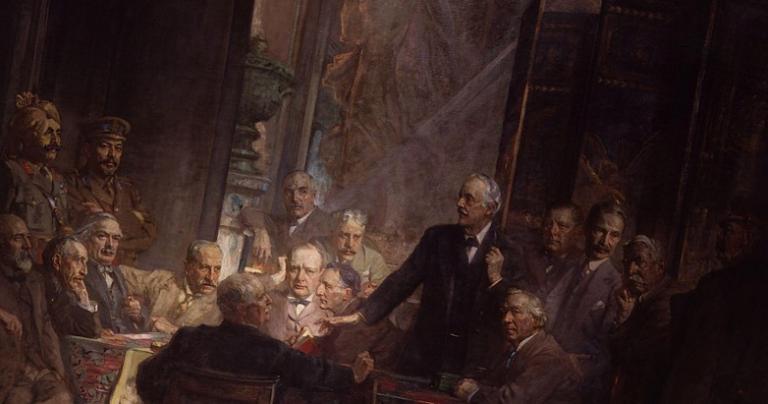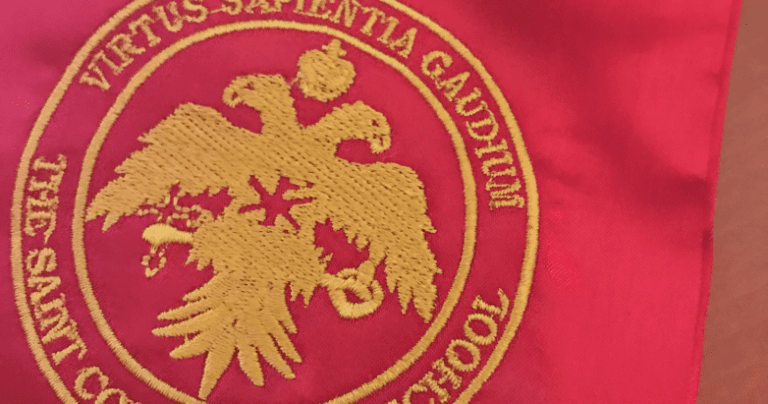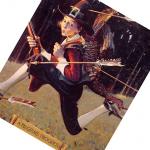 Some classical educators just now claim they are the answer to what ails us, when they are part of the reason we are sick. World War I is one hundred years ago. At the moment the world is reflecting on what caused that horror, classical education is making a come back. Those of us who are part of that movement should bring back the form of education with care.
Some classical educators just now claim they are the answer to what ails us, when they are part of the reason we are sick. World War I is one hundred years ago. At the moment the world is reflecting on what caused that horror, classical education is making a come back. Those of us who are part of that movement should bring back the form of education with care.
We would not want to have taken one hundred years to forget that classical education contributed to the War that helped set back civilization.
The manly Christianity built to save Christian England that was found in Arnold’s Rugby School and given a highly influential fictional treatment in Tom Brown’s School Days failed. It did not just fail a bit, but catastrophically. If you love classical education as I do, believe it to be the best approach to education, then you must not only praise the successes (you can thank us for a mighty contribution to the good in the civilization in which you live), but must also account for the errors.
Latin cannot save us.
Plato and the great texts can damn us. Ask the generation that went to Oxford only to be sent by other Oxford graduates to the hell on the Western Front.
Nor is it the case that a dollop of Christianity can do the trick: a few chapels, even when mandatory, did not keep the men of 1914 from blowing up the world.
The critic of civilization, including the narrow minded Christian, looks at this and smugly says that it is classical Christian education that is the problem.
Nonsense.
How do we know?
Before 1914 too often the critics of classical education offered as a replacement a mix of treacly hymns, slogans, and King and country patriotism that utterly failed to prevent the apocalypse and produced little of merit culturally. They attacked an error by becoming worse.
Classical Christian education depends on Jesus as the Word: the Revelation of God to us. Oddly to most non-Christians, this keeps Christians from worshipping any other man. If a teacher who is NOT Jesus claims to “know,” then we say: “No.”
The job of educating the soul stands in tension with the other important job of the University: discovery of ideas, invention, and creation. Ideally, a good man is good at science, art, or literature, but the wise, fit to be a mentor, is not always the knower, great at research.
The drive towards research was not bad in the University. In fact, it was a great good, but the genius in the lab or the writers of wonderful books, did not gain virtue by his skill. That is the error of the Homeric Greeks: the best is the most virtuous. Plato began a transformation of the term “virtue” to right behavior. The best person (God have mercy on me a sinner!) is not the strongest, fastest, or smartest, but the one with courage, moderation, practical wisdom, and justice. Christians completed the change and so classical Christian schools begin (God help us!) in humility, knowing we both produced beautiful art, scientific research, or scholarship, but we must also work on our own souls.
It is easy to see the rarity of the Nobel prize winning scientist and rightly reward her achievements. Yet this may lead to devaluing the other job, the vital job, of helping all of us grow in grace and wisdom.
The great scholar before the First World War was more and more given a pass on sharing the values of the culture. The educators could quantify publications, but not character. The building of good men began to be pushed from the classrooms to “co-curricular” activities (Chapel, residence life) or sports.
Is it any wonder we began to produce leaders more Homeric, followers of the goddess of war Athena, than disciples of the Prince of Peace?
There can be experts in a field and by all means we should recognize the expertise and learn the skills they can teach. Wisdom and virtue, however, cannot be taught this way. None of us are at the end of that process so the means needed are different.
The discussion, dialog, is at the center of classical education for a reason. We all learn constantly. We all need to be transformed by the renewing of our minds. This is a great good and is the heart of classical education.
True classical education is centered in a living discussion where all of us learn. By the grace of God, we are transformed for the better. This is not to say that research is not needed and vital, but that mentoring and teaching must still take place and being good at a subject is not what makes a good teacher. Christians know that everyone is created in the Image of God, but also that all of us are broken. We are not as we should be. So in mercy, we eschew “experts” for the job of aquiring wisdom and instead learn together in discussion that begins in the fear of the Lord and ends in wisdom.
In When Athens Met Jerusalem I wrote:
When I read Homer, Plato or Aristotle with good friends, it is the mental interaction with the Bible that saves me from two twin errors. Reading Scripture in tension with other books in a strong community saves Scripture from being removed from the life I live. Wicked ideas in the ancients illuminate the power of Scripture. True ideas in the ancients expand the world presented in the Bible or illuminate in a fresh way truths already present there. It also redeems the ancient texts as sacred Scripture assimilates all that is good in them while purging all that is bad. The good and the bad in a great book are not always easy for my simple mind to see, and often what seems bad in Plato (on my first reading) turns out to be most Christian.
When God walked with Adam before the Fall, God saw that Adam was still lonely. Religion and even contact with the divine are not enough for human beings. God completed man by creating woman and bringing the woman to the man. Humans are lonely when isolated from other humans. Death has created a chronological isolation for each generation of humans. We are cut off by the Grim Reaper from those who came before us, and we become lonely in our own time—bored with the same assumptions, virtues and errors in every face we see. In reading old books, we hear the voices of other men and women brought to us over the gulf of death, and our chronological loneliness is decreased. Philosophy is never a solitary journey.
Men and women of all times and all conditions have been pilgrims on this path to God. Books are conversation starters, but true conversations have to be between living people. One good friend is more valuable than Republic or the Gospel according to Saint John because the books are for the living, and not the living for the books. The books come alive only when discussed, and they are truly discussed only when they impact the life of an authentic community. It is this living dialogue, an incarnation of the story, which in the end, by God’s grace, brings me back to the blessed Trinity. The nature of that eternal communion between three persons with one essence is the final truth: the Known Unknown. The deepest dialogue for humankind is between humans created in his image and a God who can be known in the incarnation of his Son, Jesus.
Sign up for the classical education that learned from World War I: college and K-12.

———————————————












